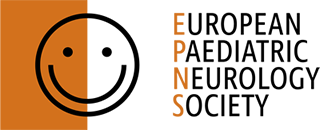At the biennial EPNS Research Meeting the EPNS usually presents 2 Research prizes of 2500 Euro each for best presentations of young researchers or research groups (selected by working group chairs and 3 annually selected members of the scientific committee).
2024 winners:
Marietta Papadoupolou, France: who is very happy and grateful for the EPNS Research Prize for the project “The ENGenE App: development and validation of an educational diagnostic algorithm on epilepsy nosology”. Marietta reported that this project is an ongoing collaborative work, supported by the ERN EpiCARE and the ILAE, aiming to create an intelligent tool for trainees and non-experts, which will enhance and stratify knowledge on epilepsy syndromic classification, with focus on genetic aetiologies. This Prize highlights the commitment of the scientific societies on supporting the use of technological advances to support training and education. Marietta intends to use the award for participation in scientific meetings in order to stay updated on the topic and support dissemination of the ENGenE App progress.
Sam Geuens, Belgium: is very honoured to be granted this award for his neuromuscular research lecture entitled ‘Development and pilot validation of the DuMAND Checklist to screen for Duchenne Muscular Dystrophy-Associated Neurobehavioral Difficulties (DuMAND)’. The funds will be used to invest in new equipment for the research group, so they can improve their functionality plus the remaining funds will be invested into additional training in research management.
6 delegates were also presented with certificates of achievement their excellent presentations
2021 winners:
Apostolos Papandreou, United Kingdom. Selected from the Movement Disorders Working Group, presented ‘Midbrain dopaminergic neurons derived from patients with autophagy-related mongenic parkinsonism are utilised for identification of disease-specific therapies’. UPDATE 27JULY2022 from Dr Papandreou: ‘I have now created 3-dimensional ‘mini-brains’ (midbrain organoid models) of BPAN (the condition I am studying); I am now characterising them to see how patient mini-brains differ when compared to ones derived by controls. The plan is to use these mini-brains as a platform to further study the efficacy of the small molecule compounds I identified in my previous work as a potential novel therapy for BPAN. The ultimate aim is to move the most promising compounds towards clinical translation as soon as feasibly possible.’
David Gómez Andrés, Spain. Selected from the Neuromuscular Working Group, presented ‘Pattern Recognition Muscle MRI in Early Onset Muscle Disorders: From Previous Works to Future Plans’.
2018 winners:
Océane Perdaens from Belgium, for her excellent presentation ‘The functional role of micro-RNA on the T-cell dependent immune dysregulation in multiple sclerosis’
Lucia Abela from the United Kingdom, for her excellent presentation ‘Development of a Patient-Derived Dopaminergic Neuronal Cell Model to Study Disease Mechanisms in Childhood Parkinsonism‘
2016 winners:
Dr Walid Fazeli from Germany: ‘I am delighted and feel honoured to have received the EPNS Research Prize 2016. The research award recognizes the translational relevance of our work and encourages us to pursue our investigations of the SCN2A mouse model with a particular focus on epileptogenesis and therapeutic strategies. I am particularly pleased that the award acknowledges my effort as a clinician to better understand mechanisms underlying genetic epilepsies by working in a basic science laboratory.’
Dr Ralista Yordanova from Bulgaria: ‘For me it is a really great honour to be awarded with the EPNS Research Prize 2016. This is a recognition that developmental assessment and surveillance with standardized and population-based tools in preschool children is of great importance. I am truly grateful about the award and believe that it will help us to improve developmental assessment in Bulgarian preschool children.’
